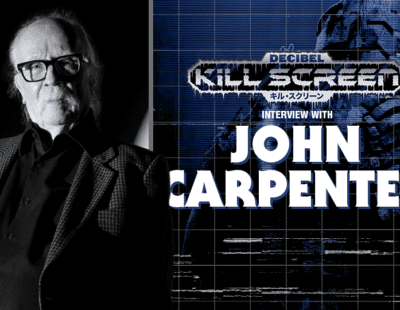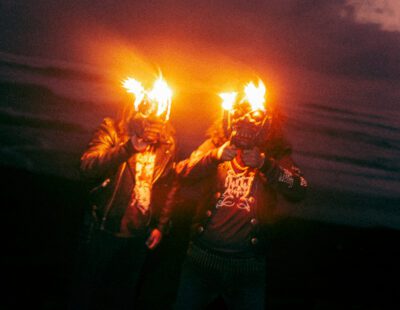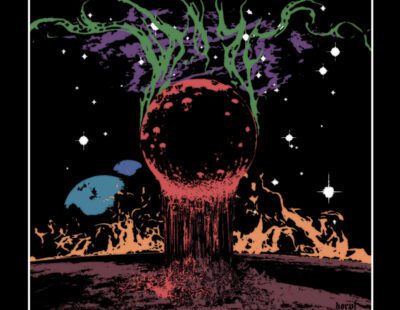
Middle Eastern blackened death metallers Melechesh originally released their fifth album, The Epigenesis, in 2010. A decade later, primarian and founding member Ashmedi discovered (or rather remembered) that his then-band of Moloch (guitars), Xul (drums), and Rahm (bass) had an instrumental version of The Epigenesis, as engineered, produced, and mastered at Babajim Studio in Istanbul, Turkey.
The release of The Epigenesis: Instrumentals via Nuclear Blast is particularly poignant now. Not only because it’ll allow content creators, social media mavens, and others to repurpose Melechesh’s Levantine madness via social media platforms like YouTube and TikTok, but also Ashmedi is currently ensconced in Fotis Benardo’s (Nightfall, ex-Septicflesh) Devasoundz in Athens, where the duo are hard at work on Melechesh’s follow-up to 2015’s celebrated Enki effort. The Epigenesis: Instrumentals is a reminder that Melechesh, now reformulated, are very much alive (and well).
Decibel sat down with friend and fellow thrash fiend Ashmedi to understand why The Epigenesis: Instrumentals makes sense now.
The Epigenesis was released in 2010. Why did you release the instrumental edition, The Epigenesis: Instrumentals, now?
Ashmedi: We had it sent to the record label with the original master back in 2010, but things move really fast; we got caught up with promotion and non-stop touring. Suddenly, we are busy with the follow-up to it, namely Enki. We literally forgot about it. Two months ago I was chatting with someone at the label, and the subject of soundtracks and such came up. I said, “Wait, we have The Epigenesis mixed and mastered without vocals. The folks at Nuclear Blast looked for it, and a couple of days later found it in their archives. It really sounds phenomenal, so we went for it. Keep in mind, these days you can release stuff digitally, so this makes the whole process possible to do on various streaming platforms like Apple Music or Spotify. This also enables further audience participation. I tend to see Melechesh not just as a musical entity with output, but as a society or a community as well; let audience be part of the experience… They are the Cosmic Nomads.
So, what’s different about the original album version and the instrumental version?
Ashmedi: During The Epigenesis sessions we felt that the album is so rich musically that is had many dimensions to offer. The instrumental version is a completely new experience, a sonic journey into space and time. It invokes different imagery! There are considerable differences too. The guitar tells the story not the vocals; there are several layered guitars and nuances that can be heard now because the mix is different, with greater emphasis on the bass guitars and those aforementioned nuances; little melodies or licks, if you like. The array of traditional instruments, which are used cosmetically, play a more important role and are more noticeable. The album can be used for background music during a drive or while hanging out at home, reading a book or whatever. But now people also can sing to it. I don’t like to use the term, but it is like a “karaoke version.” Imagine the variety of possibilities in which audiences can participate. Be it clean, operatic, extreme vocals, all different styles. It can be used as a lead guitar playback, people can add percussion over it, use it as a soundtrack to any project, be it video/visual or mixed media. I am listening to it at the moment, and I’ m hearing stuff I forgot about or didn’t notice before. Definitely a positive yet mystical journey with a sense of enlightenment or just a good neck-breaking experience.
Ashmedi: Well, on social media, there are some artistic videos and initiatives done, but also countless guitar, drums, bass, and vocal covers. People expressing themselves and being swept by the music is a great thing to see. However, these versions are done with original version. Meaning, with my vocals accompanying them, which we have done for each album. This version was released some nine or 10 days ago, so it is still too early for new audience offerings to surface on TikTok, Facebook, Twitch, Instagram, YouTube, etc. Give it a few weeks and they will start popping up. I am very curious how things will sound with the different styles and approaches the audience will have [on it].
Ashmedi: I am currently in Athens, Greece, a city I really like and feel at home in. We’re now working on our seventh album [the follow-up to Enki] here. The sessions are long and divided between re-productions and re-writing, finessing and recording. The album songs are as Melechesh as they can be with more emphasis on anger, retribution, transcendence. [It was] very liberated writing without constrains at all. We are still a long way from finishing, so it is too soon to reveal too much. All I can say the music is really, really good! Producing and our drummer on the album is my very good friend Fotis Benardo, who is now in Nightfall. He’s the owner of Devasoundz studio. Like I said, he’s very close friend, and one of the best drummers, if not the best I have ever played with. The music flows organically. It’s tight and incredibly performed. I’ll shed more light on this in the very near future. For now, we keep it vague so we don’t over-sharing anything. Stay tuned for more Melechesh information in the near future. See you Cosmic Nomads soon!
** Melechesh’s The Epigenesis: Instrumentals is out now on Nuclear Blast Records. Check out the digital edition on Apple Music, Deezer, Spotify, Tidal, and YouTube. Check out the album’s new dynamic via the Melechesh link tree (HERE).






